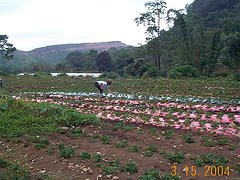 Picture This.
Picture This.You maintain a blog and you write your stuff on it. Inserting pictures, graphics, etc.. Things that you find interesting enough.
But really, your knowledge about the technical aspects of maintaining a blog has been quite limited.
But weren’t you sys-admin for many years? True, but for the most parts your responsibilities leaned more on hardware and operating systems.
Anyway, you like the way some blogs, some very popular and well-visited ones, structure and present topics to their readers. A number of them simply collate or round up randomly current topics from different blogs, with the use of a sentence or two as commentary, and of course, linking to the actual blogs themselves.
Imagine blogs that simply enumerate a list of other blogs and the topics they are discussing, with the not so magical use of links or more appropriately, hyperlinks. Pretty much acting like a gateway portal.
But what’s amazing is that in many instances the portal itself commands wider and more popular readership than the blogs being mentioned and linked to. Think Drudge Report? Or Instapundit?
Amazing!
Sufficiently enough that I too want to try it, even without benefit of prior instruction or research on how to do this in the most efficient and expeditious manner.
And why not.
So here goes, after visiting the many favorite links on this blog.
Larry Kudlow, CBNC TV host and noted economist from the Reagan years, paints a sunny picture of the Japanese economy in his blog, entitled Rising Sun and Nikkei. Larry’s optimism is quite infectious and provides a bit of sunshine during these gloomy times, if the the MSM reports are to be believed.
Indefatigable Michelle Malkin, author of a couple of booksellers and stellar blogger for the conservatives, continues her defense on terrorism policies of the administration that are in constant assault by the more incendiary rhetoric of the liberals. For somebody so petite and looking so fragile, Michelle has over time shown the stamina and power unmatched by any on the other side.
Consummate economist, Donald Luskin, for his part, never lets a hand down when jousting with nemesis, Paul Krugman, bemedalled Economics professor and NYT columnist mainstay. A must-read for any serious student of Economics. Many lessons to learn from and also on learning ways to sharpen one’s analytical processes.
And from a small group of bloggers joined together by the common bond of language, BisayaBloggers, here’s an entry of yours truly, which is nothing more than a reprint from this site.
And from one of my favorites, PowerLine, maintained by three powerhouse lawyers, here is yet another revelation why mainstream media cannot be trusted. If it is not the Washington Post, which else, but the New York Times? Mark this too as another negative mark for MSM.
NationalReviewOnline, a gathering of some of your media eagles from Peggy Noonan, Larry Kudlow, Victor Davis Hanson, to Donald Luskin. One could spend a day going through its entries.
Now who hasn’t heard and read about Glenn Reynolds, the Instapundit guru? Need I say more. Take a visit and be thrilled.
Wall Street Journal’s answer to on-line journals, Opinion Journal, brings you some of the most interesting opinions on the net. Heard about James Taranto or John Fund. Well, read them there and be informed.
The Weekly Standard’s Billy Kristol writes about paranoia in America liberalism while Fred Barnes contends with Micro Economics.
Roehlano Briones, doctor of Economics, tries to figure out if culture matters in economic perfomances. Know what his rational choice is.
And of course, Markos of Daily Kos with his cadre of Kossacks will not let the fire down in their continuing siege against all causes conservative, especially against the current occupant of the White House. This time they write about Bush’s reading habits.
Early birthday greetings to Elvis, born January 8th. The legend lives on.
TV Host Lou Dobbs has not updated his site for a while. But still do visit.
Defense and Security writer Bill Gertz writes about what the US has put on Chinese firms trading with Iran.
Victor Davis Hanson writes about Abe Lincoln and his policies as they relate to the current wars and terrorism.
Jay Rosen of PressThink shares some insights.
Lovers of New York City and its history, do not miss to visit James Lileks’ archives.
Wretchard of the Belmont Club, writing from Down Under, asks the question: Who is a journalist?
From the Philippines, Dean Jorge Bocobo of Philippine Commentary, writes about where the future leaders of the US are to be found. And mentions rotound US president William Howard Taft, who has the very distinct honor of having headed two branches of government, as President and as Chief Justice of the Supreme Court.
Joseph Phillips, actor, writer, and lover of cooking and Western films, writes about family values.
And from merry England, Albion’s Seedlings writes about cartoons and iguana on the wall.
Get your unedited political news from RealClearPolitics. You can’t go wrong.
Funny-named LittleGreenFootballs focuses on middle-eastern issues, Islam, and of course, the Dan Rather “fake but accurate” incident. Comments are allowed ; however, only those registered can do so. Unfortunately, registration is already closed. Too bad.
Drudge Report screams:
Hurricane insurance losses $57.6 bln Largest on Record.
Pamela aka Atlas contemplates on her 5th place position as favorite conservative blogress diva. Thinks Malkin should win.
Want to be a TV pundit? Jack Shafer of Slate writes on how to become one.
The Fourth Rail’s Bill Roggio responds to the WaPo post on the military’s information operations.
And finally, Michael Yon asks the question: Montage or Mirage?


























